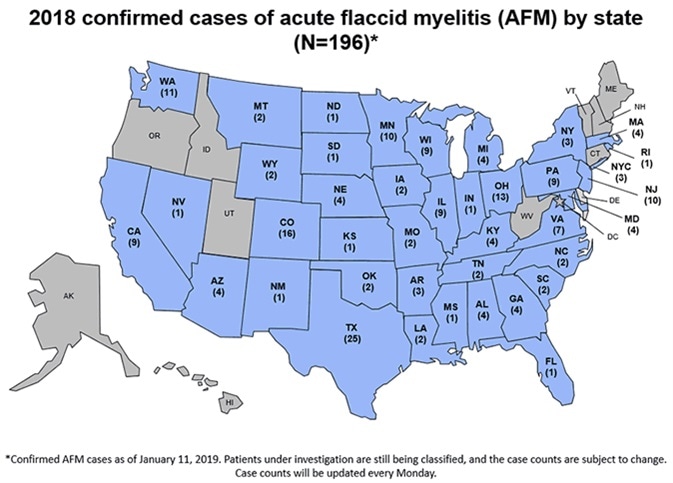Acute Flaccid Myelitis Treatment
Acute Flaccid Myelitis (AFM) is a rare disease that affects children aged 3 to 15 years. The disease involves inflammation of the spinal cord and leads to serious implications for those affected.
As of now, there is no specific treatment indicated for this condition; however, neurologists decide on a course of therapeutic interventions that are made on a case to case basis.

How is acute flaccid myelitis treated?
As inflammation of the spinal cord is common to both AFM and transverse myelitis (TM), therapies used for TM are currently recommended for AFM.
Certain therapies that have been tried include immunoglobulin, plasma exchange, corticosteroids, and antiviral therapy. The main purpose of utilizing these therapies is to decrease the inflammation, and to halt the body’s immune system from initiating further attacks. However, there is no concrete evidence that immune-modulating therapies have remarkable effects on AFM patients.
Even though no significant benefits have been associated with the use of traditional TM therapies, certain patients may benefit from specific interventions. The long term outcomes of these therapies for AFM patients are currently unknown.
Can physical and occupational therapy help?
Physical therapy is believed to aid in the recovery and helps in reducing the arm or leg weakness caused by AFM. The main goal of therapy is to regain arm and leg function, and thus help improve the quality of life. Prompt rehabilitative therapy might help in preventing joint rigidity and loss of muscles, and thus might be helpful in improving functional outcomes.
Interventions include a variety of motion and transfer training, educating patients regarding self-care, and environmental adaptation. The use of a power wheelchair has been associated with increased mobility.
Therapy exercise may also include using electrical stimulation to regain nerve and muscle action. Nerve transplantation may also be carried out to regain lost mobility; however, the procedure should be conducted within 6-12 months of diagnosis.
The extent of recovery from physical therapy varies on a case to case basis. Even though some people have experienced full recovery, some complain of muscle weakness, which persists even after a year.
Speech and language therapy can be helpful to children, especially those who have problems with communication, eating, swallowing and drinking.
Are there any ways to prevent acute flaccid myelitis?
The lack of definite causative agents of AFM makes it difficult to suggest any preventive steps. However, the following measures can be taken to protect an individual from contracting an infection.
- Getting the required vaccinations on time, in particular the polio vaccine (inactivated polio virus). This vaccine can help to protect against the poliovirus, which is believed to be one of the causative agents of AFM. However, this vaccine does not protect against any other viruses that may be responsible for AFM.
- Mosquitoes have been found to carry West Nile virus, which is another probable causative agent of AFM. Hence, minimizing exposure to mosquitoes that carry the West Nile virus may help prevent the infection.
- Following certain basic hygiene procedures, such as washing the hands with soap and water, disinfecting touched items, and avoiding contact with contagious people can help reduce the chances of acquiring an infection. This is particularly important for parents or caregivers, who are in immediate contact with affected patients.
Poor prognosis, and a lack of research, makes implementing effective treatment strategies against AFM difficult. Studies that can elucidate the pathophysiology of AFM can definitely help to develop preventive measures, and discover novel therapies for this debilitating condition.
Sources
- www.cdc.gov/acute-flaccid-myelitis/hcp/clinical-management.html
- https://myelitis.org/living-with-myelitis/disease-information/afm/
- https://www.ncbi.nlm.nih.gov/pubmed/29433111
- https://www.ncbi.nlm.nih.gov/pmc/articles/PMC6133480/
Further Reading
- All Acute Flaccid Myelitis Content
- What is Acute Flaccid Myelitis?
- Acute Flaccid Myelitis Signs and Symptoms
- Acute Flaccid Myelitis Causes and Diagnosis
Last Updated: Jan 15, 2019
Source: Read Full Article
